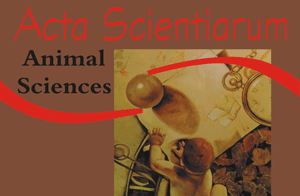ABSTRACT.
The aim of this study was to evaluate levels of inclusion of pinto beans in diets for quail in the laying phase on their performance and egg quality. A total of 280 Japanese quail in the laying phase were distributed into five treatments in a completely randomized design with eight replicates and seven birds per plot. Treatments consisted of five levels (0, 2, 4, 6, and 8%) of inclusion of pinto beans in the diets, which remained isoenergetic and isoproteic. The experiment began with the quail at 70 days of age and lasted 63 days, with their performance assessed every 21 days and egg-quality parameters on the last two days of each cycle. The following parameters were evaluated: final weight, feed intake, egg-laying rate, feed conversion (per dozen eggs and per egg mass), egg weight, eggshell thickness, specific gravity, yolk color, and weights of shell, yolk, and albumen. No difference was detected between the bean inclusion levels for any of the performance and egg-quality traits assessed or the birds' final weight. In conclusion, up to 8% raw pinto beans may be added in diets for Japanese quail in the laying phase without compromising their performance or internal-external egg quality.
Keywords:
eggs; leguminous; nutrition; by-product
